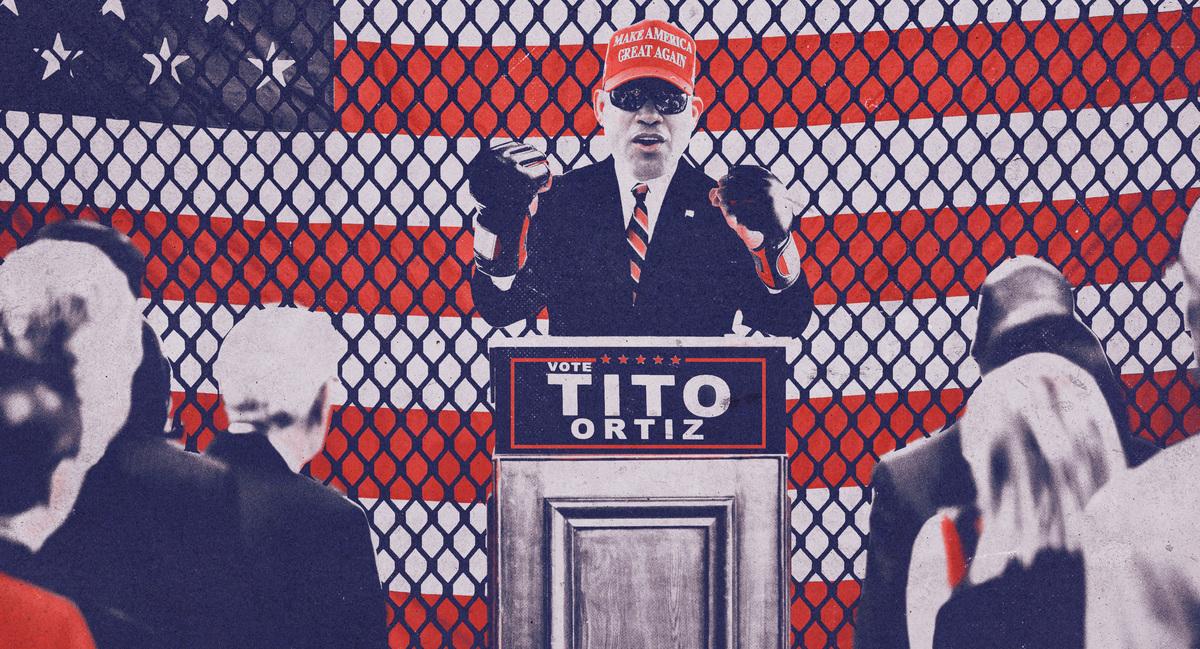The Ultimate Fighting Councilman
Former MMA star Tito Ortiz is running a Trump-inspired campaign for a seat on the Huntington Beach City Council. What, exactly, is he fighting for?As a political candidate, Tito Ortiz has at least one virtue: He isn’t afraid to press the flesh. “When I’m out and about doing these rallies,” the former UFC fighter told me, “I shake hands.” On Saturday, Ortiz was mobbed by would-be voters near the pier in Huntington Beach, California. Few of them wore masks. Ortiz wasn’t wearing one, either.
“I think COVID is the flu,” Ortiz told me between handshakes. He called COVID a form of “population control.” He thinks respirators (I think he meant ventilators) that pump air into patients’ lungs are “speeding up the process of COVID.” That whopper, at least, came with a caveat. “I’m not a doctor,” said Ortiz.
Ortiz thinks he got COVID in March. But he claims he kicked its ass with a regimen of zinc and Z-Pak. His girlfriend, Amber Nichole Miller, was never infected. “And I’m kissing her every single day,” he said.
There’s something odd about watching the former light heavyweight champion of the world deliver a Trumpian spiel, right down to the bit about kissing. But this is by design. Ortiz, who’s running for Huntington Beach City Council, is pitching himself as President Donald Trump in MMA gloves. If a question haunting the country is “What happens to Trump’s political program now?” Ortiz has a peculiar answer. Trumpism is coming to a municipal election where the maximum contribution is $600.
This summer, Ortiz set out on a vague quest for public service. In June, he told TMZ that he wanted to be a police officer. Then he decided to run for mayor of Huntington Beach. But you can’t run for mayor of Huntington Beach—the mayor is chosen by the city council. So Ortiz joined 14 other candidates to run for three seats on the council.
“MAGA-ween,” a pro-Trump rally crossed with a costume party, was a chance for Ortiz to show how he’d turned his campaign into a presidential love letter. Ortiz arrived at the pier around 11:00 on Saturday in a Latinos for Trump T-shirt. His campaign signs, which hung on the side of a hotel across the Pacific Coast Highway, have the same color scheme and design of Trump’s.
I live in Huntington Beach. I can tell you that Ortiz’s campaign is not a put-on, at least any more than Trump’s 2016 campaign was a put-on. Tito is everywhere. His face smiles back at me from campaign literature that arrives in the mail. Last month, while paddleboarding through a local harbor, I glided by Ortiz’s boat, which was festooned with campaign signs.
At MAGA-ween, Ortiz waited patiently through nearly two hours of speeches. When he finally took the mic, he wanted to talk about protests.
On June 6, social-justice protesters had gathered in Huntington Beach near the same pier. “They’re going to come down and burn this city down,” Ortiz told the crowd. “They’re going to rape the women and the children.”
That claim, of course, is as baseless as Trump’s own claims about protesters. But on June 6, Ortiz was moved to act. He donned an “HB Strong” T-shirt, a bulletproof vest, and camo pants. Ortiz parked himself in front of a local surf shop and eyed the protesters across the street.
“As I looked to the left of me,” Ortiz told the crowd, “I saw 10 black guy—or 10 guys all dressed in black. And they’re trying to flank us. I looked at them and I said, ‘Oh, no no no no no.’” He ordered the protesters to step back.
One of the protestors—this is in Ortiz’s telling—said it was a free country. Ortiz recalled his reply: “You’re correct. But not in Huntington Beach.” Where other cities in Southern California had shuddered under the weight of protest, Ortiz said, HB stood strong.
The rest of Ortiz’s nine-minute speech was a jukebox musical of Trump themes like cops, CNN, and Trump’s own noble qualities. He closed with a tagline straight out of the big man’s handbook. “I want to welcome all you guys to Huntington Beach,” Ortiz told the crowd. “And I will make Huntington Beach safe again!”
In the UFC, Ortiz crafted a trolling persona known as the Huntington Beach Bad Boy. The moniker describes his standing in his hometown, too. For most of his adult life, Ortiz was less a pillar of society than someone who attained an uncancelable form of celebrity. As with Trump, politics is Ortiz’s chance to go respectable.
Ortiz talks about Huntington Beach as his personal oasis. It was the place he arrived after spending his childhood years in nearby Santa Ana, where he was a member of a gang called F Troop and his parents were heroin users. At Huntington Beach High School, a Spanish Colonial Revival building on Main Street, Ortiz became a wrestler. “Wrestling saved my life,” he told me.
But Ortiz wasn’t the kind of jock who became the school’s golden boy. That role, in fact, was filled by Tony Gonzalez, the future Kansas City Chiefs tight end who was a year behind Ortiz. “Tito wasn’t necessarily there to make friends and be popular,” said K.C. Wolbert, who was on the wrestling team with him. “He was there to accomplish what he wanted to accomplish.”
When I asked Ortiz if he was the class president type, he told me: “I had good enough grades to get me eligible to wrestle.”
After high school, Ortiz worked for a moving company and got hooked on meth. He credits a college wrestling coach with luring him back to the sport and putting him on course to join the nascent Ultimate Fighting Championship, where his scenery-chewing and feud with Chuck Liddell helped grow the company. At 45, Ortiz still considers himself an active fighter. He said on a recent podcast that he intends to start training camp after the election.
In 2010, Ortiz was arrested on suspicion of domestic violence after an altercation with his then-girlfriend Jenna Jameson. (Prosecutors didn’t press charges because of what they called “insufficient corroboration to prove the case beyond a reasonable doubt.”) Four years later, Ortiz got a DUI. Dan Kalmick, another candidate running for city council, told me: “I’ve been continuing to keep HB safe by not taking up police resources by having them come to my house.”
But at least in civic terms, Huntington Beach hasn’t shunned Ortiz. Just the opposite. In 2017, he appeared in the city’s enormous July 4 parade. “He shows up with one sign and 50 people come out to take pictures,” said Gracey Van Der Mark, a fellow city council candidate who’s running with Ortiz as part of a “conservative trifecta.” “It’s all positive.”
Ortiz captures something elemental about HB. When he campaigns in a T-shirt, shorts, and flip-flops, Ortiz reflects the civic ideal that all earthly striving must be cloaked in a no-worries air. Last Friday, I made the mistake of showing up at the HB pier in a button-down shirt, jeans, and loafers. A man I was trying to interview lectured me about media perfidy. For MAGA-ween, I dressed like Ortiz right down to the flip-flops. Despite my conspicuousness as a reporter (the mask, the notebook), nobody said an unkind word.
“Government’s really boring,” said Kalmick, who serves on the city planning commission. “You have to have the temperament for this. It’s complicated. And it requires a certain set of skills honed over a period of years.” Kalmick added of Ortiz: “I don’t think he’s ever been to a city council meeting until a couple of days ago.”
Ortiz, of course, doesn’t claim to be a policy wonk. As he sees it, running for office is a way to one-up other agitators who’ve given up on California. As Ortiz told the crowd on Saturday, “Joe Rogan, a bunch of other Hollywood guys—they left.” He added: “My city’s stepping down. I’m stepping up. And I’m going to save it.”
On May 31, six days after George Floyd was killed by a policeman in Minneapolis, word got around that there was going to be a social-justice protest near the Huntington Beach pier. I walked down Main Street, a heavily built-up artery that has the air of a Mexican resort city. Downtown Huntington Beach is a Tito Ortiz kind of place. There is often a large brunch crowd and—though I haven’t seen him lately—a man holding a snake.
That morning, downtown was filled with the sound of whirring saws. Shopkeepers were boarding up their windows with plywood to ward off looting. Starbucks, the Sugar Shack—everything was boarded up. “You can help if you want!” a man yelled when he noticed me taking a picture.
At the pier, I found a modest group of maybe a few dozen protestors. They chanted “No justice, no peace!” and applauded politely for various speakers. A woman held a sign that said, “Here For The Cause AND The Bitches.”
Over the next few hours, counterprotesters appeared on the opposite side of the Pacific Coast Highway. Soon, the two groups found themselves facing off. Then the police declared unlawful assembly.
“We had a peaceful protest show up,” said Kalmick. “We had a counterprotest show up. And the peaceful protest was ended.”
A week later, when there was a second social-justice protest near the pier, Ortiz was standing sentry in front of the surf shop. “For 10 hours I stood on my feet,” he told the crowd on Saturday. “No food, no water, no restroom break. You know why? Because I didn’t give a shit. I was ready to sacrifice my life.”
It was a fascinating, almost Trumpian bit of stagecraft. There was no large threat that downtown Huntington Beach would “burn.” But the mere appearance of protesters had made for a useful specter—and a launching point for Ortiz’s campaign. Last month, a flyer attacking progressive city council candidates warned that Huntington Beach could go the way of Portland. (Does that mean we’d finally get better coffee? a few people asked.)
“I talked to a supporter the other day of me and Tito,” Kalmick told me. “I said, ‘Why did you vote for Tito?’ He said, ‘Well, he was downtown keeping us safe.’”
There’s an even bigger irony. As residents know, the spasms of protest and extremism in Huntington Beach are overwhelmingly conservative. “In ’93, ’94, ’95, we were the safest city in America,” Ortiz told me. In fact, in 1993 there were enough Fourth Reich Skinheads hanging around that the Los Angeles Times wondered if the city was the “skinhead capital of the county.”
When the pandemic hit, the city became a magnet for anti-shutdown protests. Four thousand people—far more than the social justice crowd—filled the area near the pier over two weekends in May. “More than any other place in California,” the L.A. Times’ Jake Sheridan wrote, “Huntington Beach has come to symbolize resistance to many of the coronavirus safety rules government officials have imposed in recent months.”
In April, Governor Gavin Newsom’s decision to shut down the beach brought a yelp of protest from surfers—if a mellower one. “That guy doesn’t surf,” one surfer told me.
It takes an active political imagination to think Huntington Beach could turn into Portland. Lately, the yard signs for first-term Democratic Representative Harley Rouda have been defaced to read “Narley Rouda.” On October 24, I saw a Trump car parade trundling down Goldenwest Street that featured—this is Orange County, remember—a Lamborghini, a Porsche, and a 300GT with mounted faux-missiles and a machine gun. Several drivers stuck a thumbs up out the window, as if hitching a ride they already had.
In a county that voted for Hillary Clinton and will almost certainly vote for Joe Biden, Huntington Beach sees itself as a holdout, said Gustavo Arellano, the L.A. Times columnist and Orange County chronicler. It’s not that all of HB—or even most of it—shares Ortiz’s politics. But thanks to a pliant city government and lots of free parking, the city has become an incubator for such politics—a beachhead.
Of Ortiz’s campaign and possible election, Arellano said, “It’s going to be the most Huntington Beach thing ever.”
At MAGA-ween, Ortiz told the crowd that he once worked for Donald Trump. He did, in the TV sense: Ortiz appeared in Season 7 of The Apprentice with Gene Simmons and Lennox Lewis. Trump fired him on the ninth week, but it was enough time for Ortiz to get a sense of him as a man. “My eyes have been opened like never before in my whole life,” Ortiz told me.
That Ortiz would model himself after Trump is hardly a surprise. As The New York Times’ Elaina Plott has written, local Republicans around the country have competed to use Trump’s catchphrases and show their fealty.
Ortiz has done this far more naturally than, say, Georgia Senator Kelly Loeffler. Ortiz’s entry into politics was Trumpian in nature: He was a successful man who saw society crumbling and said, “Enough’s enough.” His campaign site lists his UFC highlights and roles in movies like Boo 2! A Madea Halloween.
Like Trump, Ortiz has shown a willful incomprehension of protest movements, casting protesters as “Antifa” or, in a particularly noxious touch, would-be rapists. Ditto Democratic-run cities that might allow for protest. “We’re not going to turn into Santa Monica,” Ortiz said at another event. “We’re not turning into San Francisco. We’re not turning into Portland.”
In the speeches I heard, Ortiz didn’t use the needling humor he wielded in the UFC. But in the intramural spats of the MAGA-verse, Ortiz has his mentor’s back. He said of Dwayne “the Rock” Johnson, who endorsed Biden, “I’d like to smash him.” Such bravado has earned Ortiz plaudits. In a recent visit to a Huntington Beach church, the activist Charlie Kirk complimented Ortiz’s toughness. An MMA fighter hardly needs the blessing, but in conservative media it was a vote of confidence.
Occasionally, Ortiz has outflanked even the Trump family. On the night of the first presidential debate, Trump’s daughter-in-law and adviser Lara posted a photo of the Trump women wearing masks. In the comments, Ortiz wrote, “Mask off.”
Ortiz—“no. 8 on the ballot”—has made concessions to local politicking. He has stumped at sites around HB. He showed off a 97-year-old supporter on his Instagram page. In a statement of qualifications he filed with the city, he promised to “make every effort to return your phone calls and emails within 24 hours.”
At MAGA-ween, Ortiz predicted he’d win his city council seat by a landslide. One day, perhaps, the council would appoint him the mayor. Then the Huntington Beach Bad Boy would become its leading citizen. It was hard to figure who’d be more surprised: the city or Ortiz himself.


